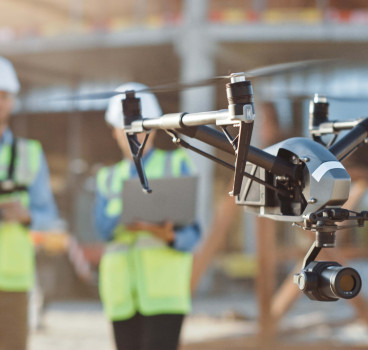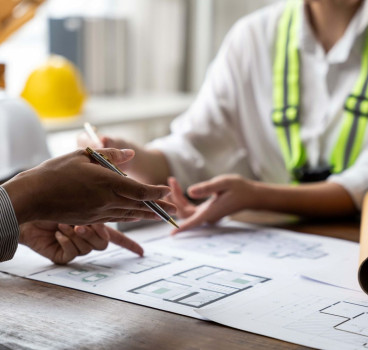Four good reasons to choose a career in construction
If you're a young person with a passion for gadgets, a knack for design, or a burning desire to protect the environment, then construction could be the perfect career path for you, one that is brimming with opportunity for those who want to build a better future. The construction industry is undergoing a radical transformation, driven by technology, sustainability and a growing need for creative problem-solvers – and now is the time to be part of it, writes John Ridgeway.
Nowadays, construction is digital, with cutting-edge technologies like Building Information Modelling (BIM) creating a virtual world where entire buildings are designed, tested and optimised before a single brick is laid. It is about robots, virtual reality and creating a new clean and green environment – just four good reasons to choose a career in construction.
While some of this is already happening within construction, the future is very much digital and we will need to attract the brightest and the best amongst our young men and women to take this technology forward – so let’s take a look at what the future has to offer.
Building Information Modelling
The rise of Building Information Modelling (BIM) opens doors to a range of exciting, tech-driven careers in construction. Think of it as a digital ecosystem for a building's entire lifecycle. It's not just 3D modelling – it incorporates all of a building's data, from architectural design and structural details to mechanical, electrical, and plumbing systems.
In simple terms it helps to identify potential conflicts between different building elements (e.g., pipes running through walls) before construction begins, saving time and money. Architects, engineers, and construction workers can also all access and update the BIM model in real-time, ensuring everyone is on the same page.
3D models allow for virtual walkthroughs, helping owners visualise the finished product and identify any design changes. In short, BIM provides a roadmap for construction, allowing for better project planning, scheduling and resource allocation.
This digital revolution creates exciting career paths for those interested in technology and construction. As a BIM modeller you would be responsible for creating and maintaining the 3D model using specialised software. This requires strong technical skills and an understanding of construction principles.
Likewise, the BIM coordinator, is the glue that holds it all together, by coordinating BIM workflows to ensure data accuracy and facilitate collaboration between different teams. This needs excellent communication and problem-solving skills.
BIM specialists probe deeper into the construction process, analysing data from the model to optimise building performance, identify cost savings and ensure sustainability goals are met. This requires analytical skills and a background in engineering or construction management.
You could be the virtual design and construction (VDC) manager, leading the entire BIM process, overseeing the creation and implementation of the digital model throughout the project lifecycle, an ideal career path if you have strong leadership qualities, technical knowledge and experience in construction workflows.
Robots on the Rise
Prepare to welcome robotic teammates who can handle dangerous tasks such as heavy lifting and hazardous material removal. Drones will be buzzing overhead, capturing aerial footage for progress monitoring and ensuring safety compliance. These robotic co-workers will free up human workers to focus on more creative and strategic tasks.
The influx of robots on construction sites might seem like a threat to traditional jobs, but it actually opens doors for exciting new career paths for young people with an aptitude for technology who can learn to program, operate and maintain these robotic co-workers. This involves understanding robotics principles, coding languages and construction safety protocols.
Robotics integration specialists will ensure robots work seamlessly alongside human crews. They will analyse workflows, identify tasks for automation and develop strategies for integrating robots into the construction process.
Construction sites will generate a wealth of data from robots and drones, which means that young people with data analysis skills will be needed to interpret this data to optimise robot performance, improve efficiency and identify areas for further automation.
The rise of robots necessitates upskilling for existing construction workers and opens doors for young people with specific skillsets. This could include robotics technician training, focusing on robot maintenance, repair and troubleshooting - crucial to keep robots operational on site.
Young people interested in aviation can obtain drone pilot licenses and specialise in capturing aerial data for construction projects. Almost certainly, new degree programmes and certifications will emerge, equipping young professionals with the technical know-how to manage and integrate robotics and automation solutions in construction.
The future construction site will be a collaborative environment. Robots will be powerful tools, but they will always work alongside human workers who will ensure their safe and effective operation. This creates opportunities for construction safety specialists, who will ensure robot safety and adherence to safety protocols.
Human-machine interface (HMI) specialists will design user interfaces for robots, ensuring smooth communication and collaboration between humans and their robotic teammates – the possibilities are endless.
The VR Revolution
Virtual Reality (VR) is rapidly transforming the construction industry, and with it, exciting career opportunities are emerging for young people such as crafting immersive 3D models that become virtual worlds for architects and engineers. VR modellers use specialised software to translate drawings into detailed VR experiences. This requires strong 3D modelling skills, an understanding of architectural principles and an artistic eye for detail.
It is not just about visuals - VR experiences need to be engaging and informative. VR experience designers create interactive elements within the model, allowing users to manipulate objects, check sightlines, and experience the space in a realistic way. This requires skills in user experience (UX) design, storytelling and potentially coding.
As VR becomes integrated throughout construction workflows, project coordinators will ensure seamless use of VR technology across different project stages. They will manage VR data, collaborate with designers and engineers and train on-site personnel to use VR tools. This requires excellent communication, project management, and technical skills.
VR allows for the creation of realistic simulations of potentially dangerous construction scenarios. It means that VR safety trainers will be needed to develop these simulations and use them to train workers on safety protocols in a controlled, virtual environment. This role requires a strong understanding of construction safety practices, instructional design principles and VR technology.
We will need VR data analysts to generate valuable data about user interactions and space utilisation. VR data analysts interpret this data to identify design flaws, optimise layouts and improve the overall building experience. This requires skills in data analysis, visualisation and potentially programming languages to work with VR data sets.
VR training also goes beyond safety. Imagine practicing complex construction tasks such as welding or operating heavy machinery in a risk-free VR environment. VR construction simulator developers create these simulations, requiring expertise in VR development tools, construction workflows and potentially game design principles.
The Green Generation
Sustainability is a major focus in construction, and it's not just a passing trend. The industry is seeking innovative solutions to minimise environmental impact. This opens doors for young minds passionate about the environment. Imagine developing energy-efficient building materials, designing structures that harvest rainwater, or implementing green roof technologies. The future of construction is about building smart and building green.
We will need sustainable materials specialists to research and develop innovative, eco-friendly building materials such as recycled content concrete, bio-based insulation, or low-carbon steel. This requires a strong science background, knowledge of material properties and an understanding of environmental impact.
Green building designers who specialise in designing buildings with minimal environmental impact will also be needed. This could involve incorporating passive solar design principles, maximising natural light, or utilising rainwater harvesting systems. This requires architectural design skills with a focus on sustainability.
Green building certification specialists will help projects achieve green building certifications. This involves understanding green building standards, conducting sustainability assessments and ensuring projects meet certification requirements.
Circular economy specialists will focus on minimising construction waste and promoting resource reuse. This could involve implementing deconstruction techniques, sourcing recycled materials, or designing buildings for disassembly and reuse. It will require knowledge of waste management and circular economy principles.
Sustainable construction site managers will lead construction projects with a focus on minimising environmental impact. This involves implementing sustainable practices like dust control, efficient resource utilisation and ensuring proper waste management on-site.
Sustainable urban planners will design cities and communities that prioritise green spaces, walkability and energy efficiency. This requires understanding urban planning principles with a focus on environmental sustainability and social impact.
Clean tech entrepreneurs will develop innovative solutions for the construction industry, like prefabricated green building modules or renewable energy generation technologies.
Are You Ready to Build the Future?
So, we can see that the construction industry is no longer just about manual labour. It's a dynamic sector brimming with innovation and opportunity for those who embrace technology and sustainability.
If you're a problem-solver with a passion for creation, the construction industry of tomorrow is waiting for you. So, ditch the outdated stereotypes and get ready to be a part of the future – it will be built on cutting-edge technology, sustainability and the bright minds of the next generation.
Additional Blogs

Drones in Construction: Are UAVs the Future of Site Inspections?
Technology integration is necessary for construction companies to survive in this evolving industry. Unmanned aerial vehicles or UAVs, such as drones, are poised to be the next big thing in site...
Read moreThe unseen carbon cost of late design changes
There is a particular moment in almost every project when someone says, “It’s only a small change.” A wall shifts half a metre. A grid tightens. A plant room grows. A façade is reconfigured to...
Read more

When compliance becomes the enemy of good design
There is a particular comfort in compliance. It comes in the form of certificates, checklists and sign-offs. It reassures clients, satisfies insurers and protects professionals from liability. In an...
Read more